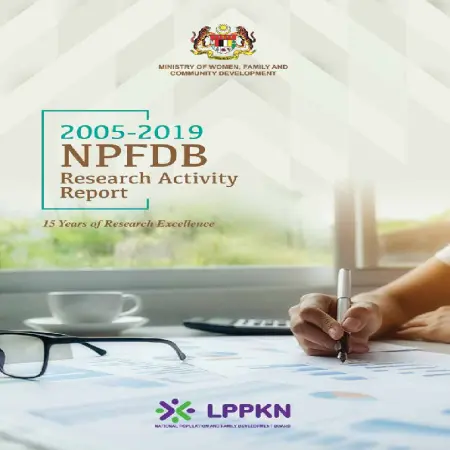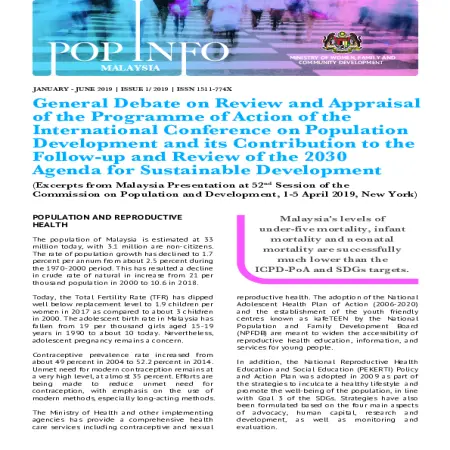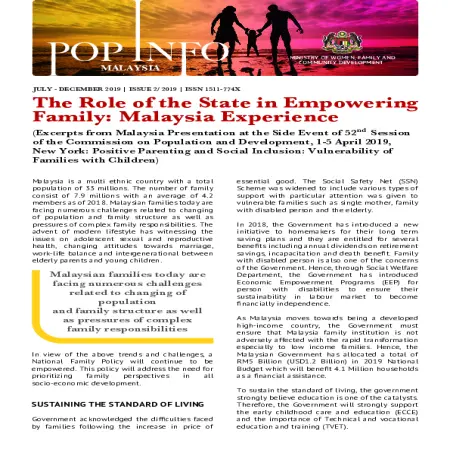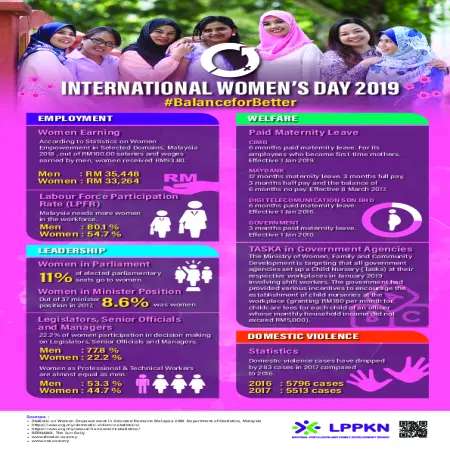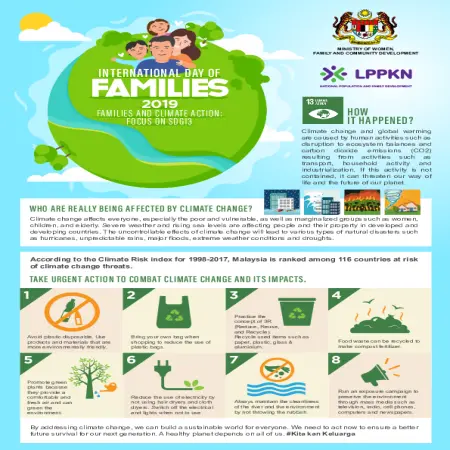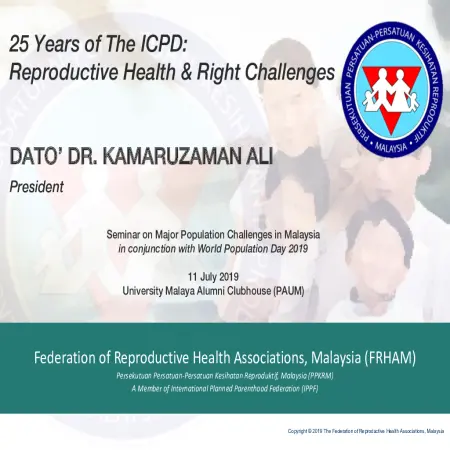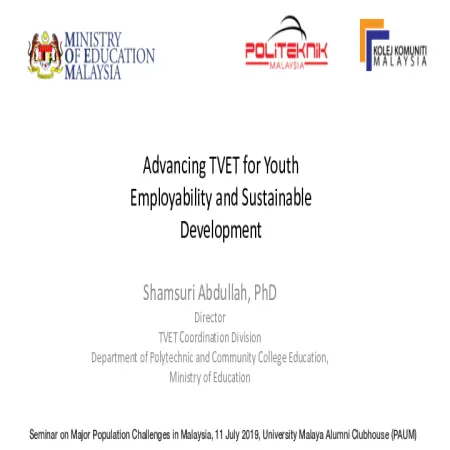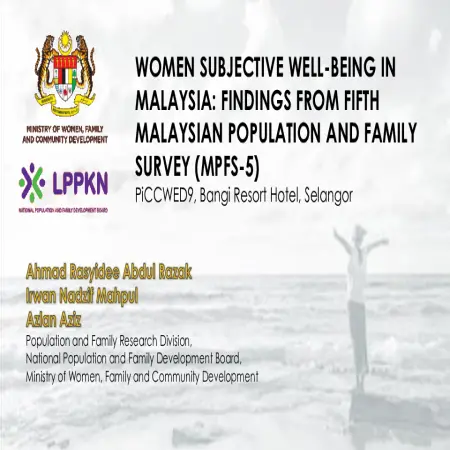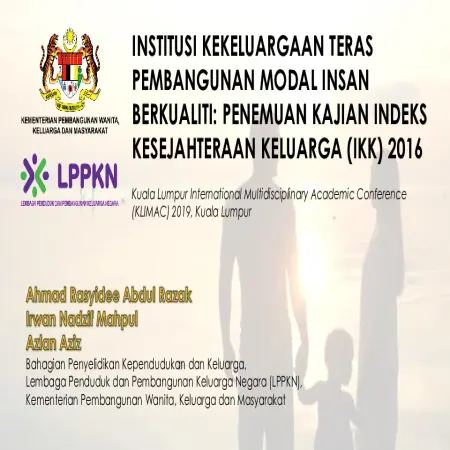PUBLICATIONS
|
|
2005-2019 NPFDB research activity report
Item Type: Book
Editor:
Year: 00/00/2019
Abstract: This report highlights the research programmes and activities conducted by NPFDB over the past 15 years. One of the primary functions of NPFDB is to identify, promote and conduct research and studies on population, family development and reproductive health. NPFDB is responsible to advise the government on matters relating to policies and programmes through the findings of research in these three thematic areas. The Board established the Research Committee in 2009 to identify priority research, provide guidance and monitor the research activities in NPFDB. The first Research Committee meeting was held on 13th January 2010 comprising of selected NPFDB Board Members including Associate Professor Tey Nai Peng as Chairman (University of Malaya), Associate Professor Normah Mohd Dali (MARA University of Technology), Datuk Dr. Zulkifli Haji Ismail (Selangor Medical Center), Associate Professor Siti Hawa Ali (University Science Malaysia), Dato’ Dr. Kamaruzaman Ali (FRHAM) and Mr. Lee Wee Min (Focus on the Family) and several division directors of NPFDB.
|
|
|
|
|
|
General debate on review and appraisal of the programme of action of the International Conference on Population Development and its contribution to the follow - up and review of the 2030 agenda for sustainable development
Item Type: Newsletter
Editor:
Year: 00/00/2019
Abstract: The Population of Malaysia is estimated at 33 million today with 3.1 million are non-citizens. The rate of population growth has declined to 1.7 per cent per annum from about 2.5 per cent during the 1970-2000 period. Malaysia is moving towards becoming one of the aged countries by 2030. The fast pace of ageing population is as a result of longer life expectancy and rapid decline in Total Fertility Rate (TFR).
|
|
|
|
|
|
The role of the state in empowering family: Malaysia experience
Item Type: Newsletter
Editor:
Year: 00/00/2019
Abstract: Malaysia families today are facing numerous challenges related to changing of population and family structure as well as pressure of complex family responsibilities. The advent of modern lifestyle has witnessing the issues on adolescent sexual and reproductive health, changing attitudes towards marriage, work-life balance and intergenerational between elderly parents and young children. In view of the above trends and challenges, a National Family Policy will continue to be empowered.
|
|
|
|
|
|
International Women's Day 2019 # BalanceforBetter
Item Type: Infographic
Editor:
Year: 00/00/2019
Abstract: This infographic shows statistics on women's involvement in Malaysia in areas such as employment, leadership, welfare as well as incentives provided by the government and the private sector in supporting women's involvement in the labor force.
|
|
|
|
|
|
International Day of Families 2019: families and climate action: focus on SDG13
Item Type: Infographic
Editor:
Year: 00/00/2019
Abstract: Climate change and global warming are caused by human activities such as discruption to ecosystem balances and carbon dioxide emissions (CO2) resulting from activities such as transport, household activity and industrialization. If this activity is not contained, it can threaten our way of life and the future of our planet.
|
|
|
|
|
|
Differentials in sexual and reproductive health knowledge among East Malaysian adolescents
Item Type: Article
Editor:
Year: 00/00/2019
Abstract: The aim of this study was to assess the knowledge of East Malaysian adolescents on sexual and reproductive health issues. Data were collected in March–July 2015 from 2858 adolescents aged 13–18 years from selected East Malaysian secondary schools using a self-administered questionnaire. Twelve items relating to sexual and reproductive health were used to measure respondents’ knowledge based on their responses ‘True’, ‘False’ or ‘Don’t know’, with the proportion of correct answers being the variable of interest. Cronbach’s alpha for the twelve items was 0.761 and the mean knowledge score was 6.8. While the majority of the respondents knew that a woman can get pregnant if she has sex with a man and that HIV and AIDS can be transmitted through sexual intercourse, knowledge about Malaysia’s abortion laws, that a woman can get pregnant if she has sex only once and that people with sexually transmitted infections may look healthy was poor. Older respondents and those from urban schools reported significantly higher knowledge than younger respondents and those from rural schools, respectively. More emphasis should be given in schools to the specific topics for which low levels of sexual and reproductive health knowledge were found, with greater attention being given to younger adolescents and those in rural areas.
|
|
|
|
|
|
25 Years of the ICPD: reproductive health and rights challenges
Item Type: Conference or Workshop Item
Editor:
Year: 00/00/2019
Abstract: To increase contraceptive prevalence will require strengthening the information, education and skills development of health care providers, repositioning of family planning, more public awareness on benefits and side effects of modern contraceptives, keeping abreast with modern contraceptive technology including LARC, male/boy responsibility programs, better data collection and monitoring including from the young and unmarried, collaboration and coordination with all stakeholders and delivery of quality services to all without discrimination and stigmatization.
|
|
|
|
|
|
Women subjective well-being in Malaysia: findings from Fifth Malaysian Population and Family Survey (MPFS-5)
Item Type: Conference or Workshop Item
Editor:
Year: 00/00/2019
Abstract: This presentation slide aims to measure the subjective well-being of women between age 20 to 59 years old in Malaysia. A total of 8, 171 respondents in the Fifth Malaysian Population and Family Survey (MPFS-5) with different marital status, employment status, ethnic and strata who answered the PWI instrument were analyzed.
|
|
|
|





